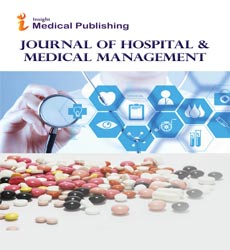PCR Methods for Quantification of Trypanosoma cruzi DNA in Blood Samples from Chagas Disease Patients
Stamy Alemu
DOI10.36648/2471-9781.21.7.293
Stamy Alemu*
Department of Management, University of Business and Economics, Ethiopia
- *Corresponding Author:
- Stamy Alemu
Department of Management, University of Business and Economics, Ethiopia
Tel: 8233852008
E-mail: stamibonny11@gmail.com
Received Date: September 04, 2021; Accepted Date: September 10, 2021; Published Date:September 15, 2021
Citation: Alemu S (2021) PCR Methods for Quantification of Trypanosoma cruzi DNA in Blood Samples from Chagas Disease Patients. J Hosp Med Manage Vol.7 No.9:293.
Editorial
A global investigation was performed by 26 experienced PCR labs from 14 nations to assess the execution of duplex quantitative on going PCR (qPCR) procedures based on Taman probes for location and measurement of parasitic burdens in fringe blood tests from Chagas disease patients. Two strategies were examined: Satellite DNA (SatDNA) qPCR and kinetoplastid DNA (kDNA) qPCR. Both techniques incorporated an interior enhancement control. Reportable reach, logical affectability, limits of discovery and evaluation, and accuracy were assessed by worldwide rules. In addition, inclusivity and elatedness were assessed with DNA from stocks addressing the different Trypanosome cruzidiscrete composing units and Trypanosoma rangeli and Leishmania spp. Both methods were tested against 156 blood tests given by the member research centres, including samples from intense and persistent patients with fluctuated clinical findings, tainted by oral course or Victoria transmission. kDNA qPCR showed preferable insightful affectability over SatDNA qPCR with cut off points of discovery Chagas disease (CD), caused by the protozoan Trypanosoma cruzi, affects mostly the poor populations in 21countries of the Americas, where close to 7 to 8 million people are infected, 25 million are at Organization, last accessed November 1, 2014 .
In recent years, this neglected tropical disease is becoming a global concern because of the increasing migration from Latin America to non-endemic countries from Europe and North America. Complex interactions between the genetic background of the parasite and the host and environmental and epidemiologic factors determine the outcome of the infection. In the acute phase of CD the symptoms are variable, and in most cases resolve spontaneously after some weeks. Appropriate treatment can eliminate the parasite during this phase, but the infection is only recognized in 1% to 2% of infected persons during the acute phase. In the chronic phase, approximately 70% of seropositive persons are asymptomatic, whereas 30% ultimately develop serious cardiac and/or digestive disorders several years or decades later, and necrotizing inflammatory injuries in the central nervous system in cases of CD reactivation under immune depression. Each year, 2% to 3% of symptomatic persons start to present manifestations that can rapidly evolve to sudden death. However, the factors that govern the progression of chronic CD remain unknown, and no prognostic markers areavailable. Accurate diagnostics tools and surrogate markers of parasitological response to treatment are priorities in CD research and development. To develop an accurate laboratory tool for diagnosis and treatment follow-up, several difficulties need to be addressed, such as the low and intermittent number of circulating parasites during the chronic phase of infection and parasite genotype diversity, because six discrete typing units (DTUs), TcI to TcVI, are unevenly distributed in different endemic region.
Quantitative constant PCR (qPCR)- based tests may fill these holes, however their application in the clinical practice re-quires earlier logical and clinical approval studies. Sofar, a couple of continuous PCR techniques have been created for T. cruzi DNA identification and evaluation in CDpatients. As some portion of the Small Grants Program (joined initiative of Communicable Diseases Research/Pan-American Health Organization) and The Special Program for Research and Training in Tropical Diseases/United Nations Development Program/United Nations Children's Fund/ World Bank/World Health Organization, a global examination was performed by 26 experienced PCR labs from 14 countries to survey the presentation of duplex qPCR strategies based on Taq Man tests for recognition and quantification of the parasite loads in blood tests of CD patients.
Open Access Journals
- Aquaculture & Veterinary Science
- Chemistry & Chemical Sciences
- Clinical Sciences
- Engineering
- General Science
- Genetics & Molecular Biology
- Health Care & Nursing
- Immunology & Microbiology
- Materials Science
- Mathematics & Physics
- Medical Sciences
- Neurology & Psychiatry
- Oncology & Cancer Science
- Pharmaceutical Sciences
